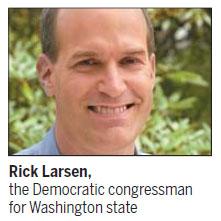Rick Larsen, the Democratic congressman for Washington state, has his own take on US-China relations. He is optimistic about this relationship and has a unique and fitting analogy.
"The US-China relationship is like the stock market - they always have these ups and downs, but the trend is always upward," said Larsen, who also serves as co-chair of the US-China Working Group.
Larsen, 47, has led five congressional trips to China since 2006 - co-organized with the National Committee on US-China Relations. The latest one took place in February when a group of five congressmen, including Jim Costa of California and Leonard Lance of New Jersey, met government officials and business leaders in Beijing, Shanghai and other cities.

Larsen, who first visited China in 2003, said he is a young "China hand", indicating there is a lot more to learn every time he visits.
"Every time I go to China, I learn so much and I realize how much more I have yet to learn about the country," he said, proudly listing a dozen cities he has visited across the country.
Larsen, who co-founded the US-China Working Group in 2005 with Senator Mark Kirk, when he served as a congressman for Illinois, has also been keenly following the proceedings of China's National People's Congress.
"We will be looking at the new leadership's approach to regional security issues," said Larsen.
He said the US will also be looking at the economic reform efforts by the new leadership led by President Xi Jinping.
"The economic reforms that will take place in China are important, not just for US-China trade but for China and world trade," he said.
"The US needs to continue our slow effort to reform our economy by getting our fiscal house in order," he added.
China is the third-largest export destination of the US and a $250 billion market for US companies, according to the Washington-based US-China Business Council, which represents more than 250 US companies doing business in China.
Larsen said the world's two largest economies should continue to focus on engagement on issues of mutual benefit and disagreement.
"We may be engaging over things we disagree on, but still need to engage. Our countries are just too interdependent upon each other, so we just cannot afford to not to engage with each other," he said.
"A new resolve for stronger military-to-military relations that are consistent" is needed to promote a healthy outlook for bilateral relations.
Read more:

Copyright ©1999-2011 Chinanews.com. All rights reserved.
Reproduction in whole or in part without permission is prohibited.